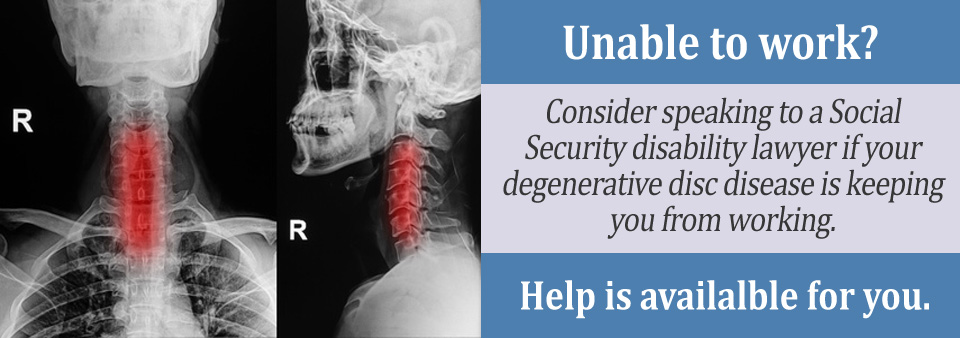With the Social Security Administration (SSA) denying a majority of disability benefits claims, you still can gain financial assistance by filing an appeal with the federal government agency.
Filing an appeal for a degenerative disc disease disability claim involves submitting more convincing medical evidence, as well as undergoing a series of physical tests that comprise a Residual Functional Capacity (RFC) assessment.
With the help of a Social Security disability attorney, you can turn denied disability benefits into financial assistance that helps you pay for the medical bills associated with degenerative disc disease.
Understanding the SSA Blue Book
A team of medical examiners at the SSA reviewed your initial claim to determine whether you qualify for financial assistance because you suffer from degenerative disc disease.
The SSA refers to a medical guide called the Blue Book to make decisions regarding Social Security disability claims. Although degenerative disk disease lists in the Blue Book, your symptoms might not match the degree of severity as listed in the SSA medical guide.
Degenerative disc disease represents a medical condition that slowly worsens over time. If you are in an early stage of this medical condition, you might still be able to complete the standard job functions expected of you by your employer.
However, later stages of degenerative disc disease can cause incredible pain that makes it impossible to work in any type of job, whether you are on your feet all day or sit at a desk throughout most of your daily work routine. Severe symptoms of degenerative disc disease also include loss of balance and tingling sensations up and down the spine.
Submit the Results of Diagnostic Tests
If you were denied a claim with degenerative disc disease, the key to reversing the negative outcome of your initial claim lies in the medical evidence that you submit with an appeal. You should send the SSA results of any imaging tests, starting with x-rays that can detect any displacement of one or more discs located in your spine.
X-rays represent the first stage of imaging tests and if your physician notices any abnormalities, the time has come to undergo MRI and CT scan tests to determine the severity of the damage caused by degenerative disc disease.

Complete an RFC Assessment
Diagnostic tests performed at a medical center can provide evidence that you suffer from degenerative disc disease. However, an RFC assessment conducted by a medical examiner from the SSA can determine how much of an impact your symptoms have on your job performance.
An RFC assessment measures how much work you can do while dealing with the symptoms of degenerative disc disease. The physician overseeing your RFC assessment might put you through a couple of exercises that test your ability to pick up objects of different weight.
You might also perform simple physical tests such as standing up from and sitting down in an office chair to test your sensibility to the movement of the spine.
Request a Free Case Evaluation for Denied Social Security with Degenerative Disc Disease
You have 60 days after receiving the letter that describes your degenerative disc disease denied disability claim to file an appeal. The first thing on your to-do list should be to go through a free case evaluation that is conducted by a Social Security attorney.
Your lawyer determines what additional medical evidence you need to submit for the SSA to overturn the decision it made the first time around.